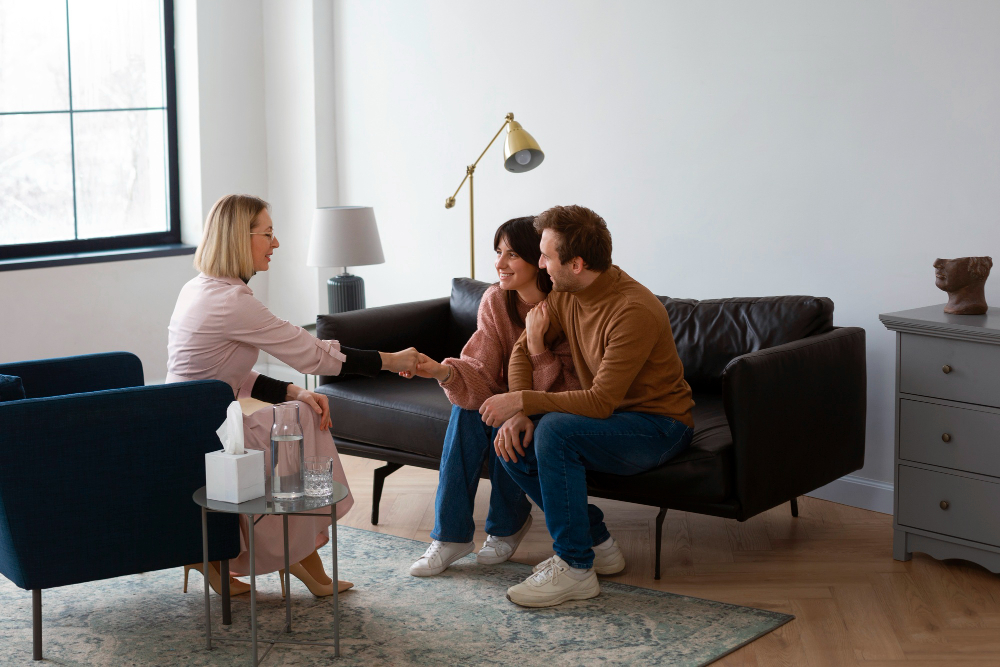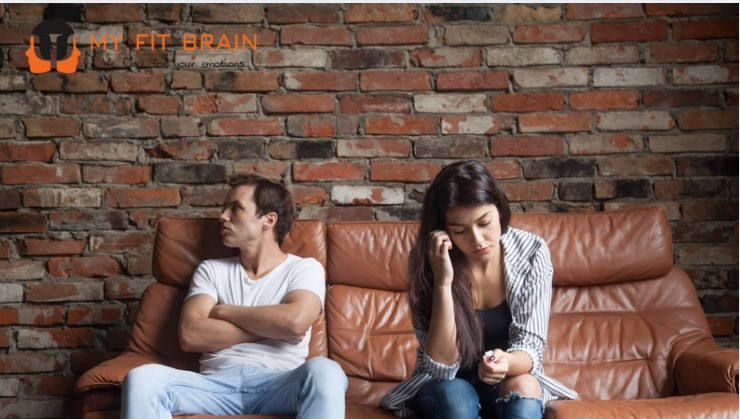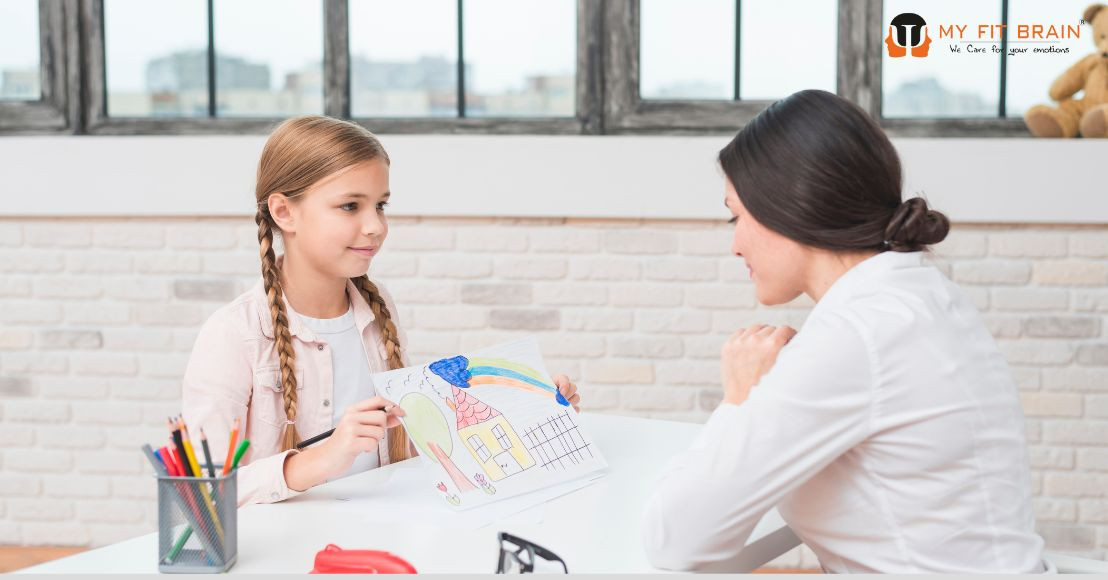Package of 5 Sessions
- Rs.5,999.00/-
Discover how relationship counselling helps couples resolve conflicts, improve communication, and build stronger emotional connections for a happier, healthier bond.
 Dr. Neha Mehta
Dr. Neha Mehta  19 Nov 2025
19 Nov 2025  Marriage & Relationship
Marriage & Relationship  43 Reads
43 Reads  7 min Read
7 min Read _1763444447.jpg)
Sometimes late at night, when the house is finally quiet you catch yourself thinking about the small things that used to feel big. The way they laughed at something silly. The way they held your hand without being asked. And then, the things that feel big now the silence, the sharp tone, the accidental distance that somehow grew roots.
It’s strange how relationships shift. Quietly. Like the weather. You don’t notice the storm until the room smells like rain. And maybe that’s why relationship counselling exists not as a rescue siren but as a place where two people sit down and say, “We still care… but something isn’t working, is it?”
_1763443602.jpg)
And the counsellor, calm in their own practiced way, says, “Let’s see where the threads tangled.” There’s no judgment there. Just space. A rare thing these days.
It rarely happens dramatically. No fireworks. No catastrophic explosion. Instead, something softer, almost a bitter calm. A conversation avoided a need to swallow. A misunderstanding left unexplained because you were too tired, or busy, or irritated, or no, that’s not quite right maybe scared. And before you know it, your partner becomes a familiar stranger.
People often come to relationship counselling saying things like:
“I don’t know what happened.”
“Everything feels tense.”
“We talk but we don’t connect.”
“I love them… I think… but I’m exhausted.”
These sentences carry a quiet thunder inside them. A heaviness that doesn’t need a diagnosis, just attention. Counselling is where you place that heaviness on the table. Gently. Carefully. But honestly.
Let’s be real. It’s not two people on a couch politely airing grievances in a tidy, therapeutic monologue. It’s messy. It’s clumsy. It’s… human.
One partner talks too much. The other mumbles a single sentence that says everything. Someone gets defensive. Someone cries. Someone apologizes too quickly out of habit, not conviction. And the counsellor? They don’t fix you. They don’t fix the relationship either. They hold up a mirror. And you see things you had edited out of your own narrative.
You realize the argument last week wasn’t about the wet towel on the bed. It was about feeling unseen. Disregarded. Pushed aside. You realize you weren’t “nagging” you were begging for connection in a language you hoped they’d understand.
You realize your anger was actually grief wearing armor. This realization, this unmasking, can feel like stepping into cold water. A shock, then clarity. A truth you didn’t know you were ready for. That’s when the healing begins.

Everyone says, “Communication is key.” But what does that even mean? Talking? Explaining? Texting faster? Using softer words? No. Honest communication raw, unfiltered, is when you tell the truth you’ve been swallowing for years.
Like:
“I miss who we were.”
“I feel alone even when you’re right here.”
“I need you to choose me before your screen, your work, your irritation.”
“I thought you’d understand without me saying anything… and maybe that was unfair.”
Counselling gives you a safe room where these sentences don’t explode, they land softly. And sometimes, in a strange twist, the moment one partner stops talking and just breathes, the other finally sees them. It’s startling… how long it takes us to understand each other.
Distance doesn’t close overnight. It closes like dawn soft, hesitant, a little uneven. Relationship counselling isn’t a magic door back to romance. It’s the slow stitching of tiny tears in the fabric. You show up each week, sometimes hopeful, sometimes annoyed, sometimes numb. And bit by bit, the stiffness between you loosens.
You learn:
There’s a moment usually unexpected when you catch your partner looking at you with tired affection and think, Oh. There you are. Not perfect. Not healed. But reachable.

Some couples think conflict means they’re breaking up. Yet, ironically, the ones truly in trouble are often the quiet ones the couples who stopped caring enough to argue. Arguments mean there’s something worth fighting for. A pulse. A flicker.
Relationship counselling teaches you how to argue without destroying the room. How to bring fire without burning the bridge. How to disagree while still choosing each other. You stop weaponizing words. You stop recycling old wounds. You stop treating your partner like the villain in a story where both of you were only ever trying to be loved in your own flawed ways.
Conflict becomes conversation. Conversation becomes connection. Connection becomes… something like home again.
Trust isn’t a switch. It’s a plant. You water it in tiny, nearly invisible ways: Replying instead of withdrawing and showing up when you promised sharing what you really feel, even when it’s embarrassing. Letting your guard down not all at once, but a sliver at a time. And trust grows, hesitantly, like it’s unsure whether it should believe you this time. But it does. Eventually, counselling creates a structured space to try again without pretending the past didn’t hurt. You rewrite the relationship line by imperfect line.
No counsellor will force you to stay together. Good ones won’t even nudge. Sometimes, after weeks of truth-telling and dismantling and rebuilding, you both decide “We still choose each other.” Beautiful. Other times, you realize the relationship is more memory than future, and letting go is an act of love, not surrender. Both are endings. Both are beginnings. Relationship Counselling doesn’t guarantee the outcome. It only guarantees clarity something you deserved all along.
Love is not self-sustaining. It needs tending sometimes painfully, sometimes joyfully, always intentionally. Relationship counselling isn’t for broken couples. It’s for brave couples. People willing to look at their own shadows, their own patterns, their own “I didn’t think that mattered” stories… and walk back toward each other with softer hands. Because love, real love, is not the absence of conflict. It’s the presence of effort. And maybe just maybe this effort becomes the quiet miracle that brings you back home.
You talk, listen, unpack patterns, and understand the emotional logic behind conflicts—all in a safe, structured space.
It can help couples rebuild trust, communication, and connection, but the outcome depends on mutual effort.
Some couples improve in a few sessions; others need months. It depends on the depth of the issues and the willingness to grow.
Not at all many couples come early to strengthen communication before things become overwhelming.
A professional counsellor remains neutral, helping both partners understand each other rather than choosing one “right” person.


A breakup can feel like the ground has slipped from beneath your feet. Whet...
 14 Nov 2025
14 Nov 2025  7 min Read
7 min Read 165 Reads
165 Reads _1762843452.jpg)

A breakup can feel like the end of the world. Whether it’s a long-term re...
 11 Nov 2025
11 Nov 2025  7 min Read
7 min Read 207 Reads
207 Reads 

Children feel emotions just like adults -- they only communicate them diffe...
 10 Nov 2025
10 Nov 2025  7 min Read
7 min Read 186 Reads
186 Reads 

Families are living ecosystems. When one component is impacted and the enti...
 06 Nov 2025
06 Nov 2025  7 min Read
7 min Read 212 Reads
212 Reads 

_1762843452.jpg)


_1762843452.jpg)

